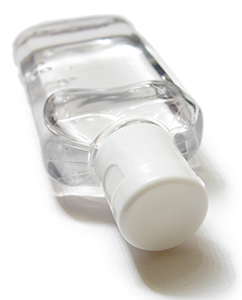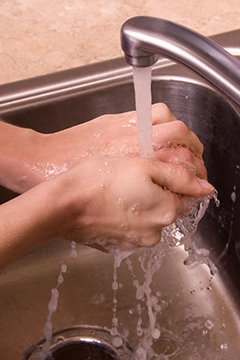Hand Sanitizers: Friend or Foe
On Dec 5, 2013

Our hands sure take a beating this time of year. Cold temperatures and the flu virus invade our homes and workplaces. Most of us stock up on hand sanitizers in the hope of avoiding illness. Since there are many hand sanitizers to choose from, it makes you wonder whether using a natural hand sanitizer is more beneficial than using a commercial product. This article will showcase the pros and cons of using hand sanitizers and whether using natural or commercial based products is better for your hands or if washing your hands with soap and water is a better option.
Natural Hand Sanitizers
More and more people are turning toward natural based products for their skin care. Why would hand sanitizers be any different? Natural ingredients such as witch hazel extract and lavender oil are proven just as effective, if not more, effective than chemical based hand sanitizer formulas. According to Bonnie Jaeckle, a former Registered Nurse and the author of the In Search of the Whole-Hearted Life blog, most essential oils have disinfectant, antiseptic and antiviral properties and can easily and quickly be used to make an effective and safe hand sanitizer. She states that both lavender and witch hazel oils have antibacterial and anti-inflammatory properties that aid your skin while disinfecting. Essential oils can be purchased in our Skin Care Store's Aromatherapy and Essential Oils section or at your local natural food store such as Whole Foods.
Let's move on to the more well known products, otherwise known as commercial hand sanitizers.
Commercial Hand Sanitizers
There are arguments from both sides when it comes to whether commercial hand sanitizers do more harm than good. According to Regina Bailey, a science educator from About.com, hand sanitizers basically strip the outer layer of oil on your skin, thereby preventing bacteria from living at the surface of your skin.
Sounds too good to be true, right? Here's the other side of using commercial hand sanitizers.

Barbara Almanza, Ph.D., an associate professor at Purdue University, notes that research shows that hand sanitizers do not significantly reduce the number of bacteria on the hand and in some cases may potentially increase the amount of bacteria on the hand. According to Practically Green, a website for tips on living a healthier lifestyle, many hand sanitizers contain questionable chemicals, including the antibacterial agent triclosan; which has been linked to endocrine disruption and it has altered hormones in animals. It’s also non-biodegradable, irritating to the eyes and skin, highly toxic to aquatic life, and known to accumulate in the breast milk of women. The American Medical Association says it may encourage bacterial resistance to antibiotics. This can be confusing as the whole reason for using hand sanitizers is to kill bacteria and other germs.
Here's another interesting tidbit: Instead of reducing the risk of infection, such “antibacterial” products may actually augment it by supporting the growth of drug-resistant bacteria. Nonetheless, Anna Bowen, M.D., M.P.H., a medical epidemiologist at the Centers for Disease Control and Prevention, says that hand sanitizers that are 60% alcohol are good at killing bacterial pathogens.
How about just washing your hands?
Hand Washing vs Hand Sanitizers

Let's face it, when it comes to washing your hands with soap and water or using hand sanitizers, washing your hands beats hand sanitizers hands down. Washing your hands for at least 24 seconds, is the proper way to kill bacteria and germs says Allison Aiello, Ph.D., associate professor of epidemiology at the University of Michigan. She also says that you need to cover all parts of your hands, including under your finger nails and dry your hands thoroughly. Dr. Almanza says that to properly sanitize the hands, soap and water should be used during hand washing. A hand sanitizer cannot and should not take the place of proper cleansing procedures with soap and water. Here's another interesting piece of information; using too many anti-bacterial soaps and hand sanitizers can lower your immunity to common strains of bacteria.
Which brings us to the positive aspects of using hand sanitizers. When you are unable to wash your hands, using a hand sanitizer is the next best thing. According to Dr. Aiello, using an alcohol based hand sanitizer is a good alternative if you can't get to a sink. Alcohol can kill viruses and this may help when hand washing is not an option says Dr. Bowen.
Whether you choose to use hand sanitizers, commercial or natural or washing your hands with soap and water, both options are better than not sanitizing at all . The cost can vary either way but it all depends on how your hands handle the product. If your hands typically dry out from commercial hand sanitizers, try using a natural hand sanitizer. This article should shed some light on what you should look for in a hand sanitizer and when it might be better to just wash your hands.

Katherine Giesen is a freelance writer, multimedia editor, and currently the assistant editor intern at Central Skin. She was born and raised in South Jersey and studied broadcast journalism in Florida. She is the author of Untouched Foods, a blog on how to reuse foods. Her interest in food and how it effects your health has inspired her to educate and entertain people on how they can improve their lives.


Comments
Leave a Comment